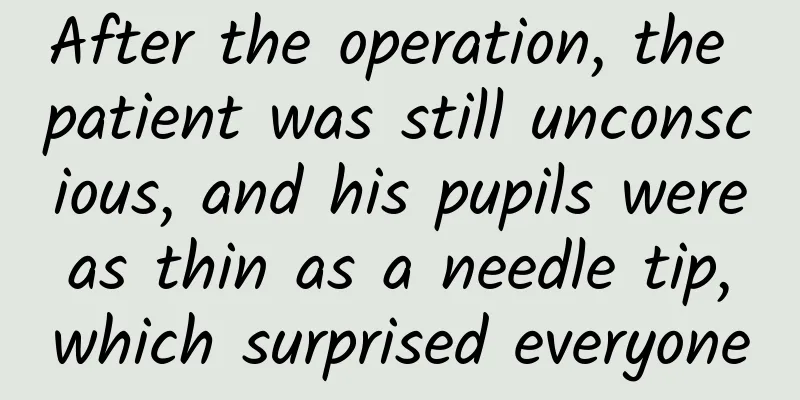After the operation, the patient was still unconscious, and his pupils were as thin as a needle tip, which surprised everyone

|
Xiao Li, who has only been working for a few years, has experienced many "storms" time and time again. In the operating room, she has experienced patients with allergies, patients with heavy blood loss, and even patients with cardiac arrest during surgery. Each incident would make her break out in a cold sweat. A few days ago, an appendectomy operation once again made her break out in a cold sweat. (The picture and text are unrelated) Hand to Hand The photos are from the 4th "Renxin Cup Most Beautiful Angels in White Photo Collection Competition" Photographer: Wang Daiyue, Qihe County People's Hospital This operation seemed ordinary, just a minor operation in general surgery, and an elective operation. Therefore, the anesthesia can almost be described as "very simple". The only variable may be that surgery may be required during the operation. Some people may say: Isn’t appendicitis cured by surgery? In the past, it was done surgically. There was even a period when people would compete to see whether the incision was one finger or two fingers long to show off their surgical prowess. But today, most appendectomy surgeries are done laparoscopically, which is more minimally invasive. For patients whose skin heals well, there may be nothing left on their stomachs. The reason why this patient was unpredictable was mainly because he had undergone intestinal surgery before. As a result, the anatomical position of the intestine and appendix in the abdominal cavity was likely to be abnormal. In addition, the possible adhesion after the last surgery made it questionable whether the surgery could be successfully completed. During the operation, Xiao Li was also extremely concerned about everything on the stage. If the surgeon decides to operate, what she needs to do is to increase the depth of anesthesia. And, it should be increased before the operation. Once the knife cuts the skin, it will be too late to use painkillers. Some people may be confused about this: the patient is under general anesthesia, so is it different when to give the painkiller? The difference here is huge: although the patient is under general anesthesia, the patient's consciousness cannot feel the pain. However, if the anesthesia is not deep enough, the body can still feel the pain. Once pain occurs, a series of changes will occur in the body: on the surface, blood pressure or heart rate will change. The internal environment will also release pain factors due to pain stimulation. These released factors will not disappear immediately, but will take some time to disappear. During this time, the pain factors may continue to affect the circulatory indicators of surgical patients, thus affecting the safety of surgical anesthesia. Suddenly, she heard the surgeons discussing whether to operate. Judging from the chief surgeon's expression and thoughts, he was almost certainly in favor of the surgery. So, Xiao Li immediately took a morphine. Considering that the operation might be quick, she only injected half of it. Sure enough, the operation started a few minutes later. Seeing the surgeon performing the operation, Xiao Li gave himself a thumbs up for his accurate prediction. Half an hour later, the incision was sutured. Xiao Li was also doing anesthesia control before the end of the operation. It was originally thought that the patient would wake up as soon as the operation was over. And Xiao Li firmly believed in this point because the anesthesia maintenance drugs she used were short-acting. The only long-acting drug was morphine, but I only used half a bottle. But from the pharmacology of this drug, such a small dose would hardly have any effect on an adult's breathing. However, he did not wake up three minutes after the incision was sutured. Xiao Li, who was puzzled, used his fingers to pry open the patient's eyes. It is said that "eyes are windows to the soul", and this statement is correct. This is completely applicable to anesthesia. The depth of anesthesia can be roughly judged by the size of the pupil. This aspect has been defined by previous anesthesiologists since the beginning of the development of modern anesthesia. At that time, pupil changes were an important sign of ether anesthesia stages. In addition, whether the conjunctiva is edematous can also determine the amount of fluid, whether there is low protein, whether there is a lot of blood loss, and intracranial pressure. However, when she pulled open the eyelids, she was shocked: both of the patient's eyes were as small as pinpoints. Seeing such pupils, she immediately realized: this is a hypersensitivity reaction to morphine. Some people may say: Is it because the anesthesia is too deep? Generally not: first, not too much analgesics are used during the operation, and the circulatory system does not show obvious inhibition of analgesics; second, the analgesics used for maintenance are a drug that is metabolized very quickly, and theoretically it will be metabolized in a few minutes. [Warm Tips] Follow us, there are a lot of professional medical knowledge here to help you understand the anesthesia issues in surgery~ |
Recommend
Staple food, are you eating it right?
Food is the most important thing for people, and ...
What should I do if I get bronchitis during pregnancy?
When you become a mother, you will truly know wha...
Will it hurt the first time you have inflammation?
For women, the first time having sex is prone to ...
37 weeks pregnant, belly feels heavy
When a pregnant woman is 37 weeks pregnant, she i...
What does hydrogen peroxide positive mean for leucorrhea
Many female friends have experienced gynecologica...
Can women lose weight by sweating a lot in summer?
Nowadays, many people are very concerned about th...
Things to note after taking the quadrivalent vaccine
Speaking of the quadrivalent cervical vaccine, I ...
What to do if you have gigantic breast disease
This is an era of beauty. In pursuit of beauty, p...
Is it okay to eat motherwort in small amounts during menstruation?
The amount of a woman's menstrual flow indica...
What to pay attention to during 30 weeks of pregnancy
After pregnancy, in the second trimester, there w...
What fruits can help enlarge breasts?
The pursuit of beauty is an eternal topic for wom...
What can women eat to help them sleep?
In life, many people often suffer from insomnia a...
[Medical Q&A] It’s scary, can a laser pen have such great “lethal power”?
Author: Song Run, Children's Hospital Affilia...
"Life-saving" plasma is not something you can donate just because you want to! To donate plasma, these conditions are essential!
rumor: Anyone can donate "life-saving" ...
What causes flat chest?
Women with flat chests are probably often critici...









